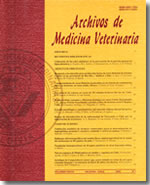Development of Fasciola hepaticaeggs in outdoor temperatures in Temuco, southern Chile
Main Article Content
Abstract
A two-year study on the development of Fasciola hepatica eggs under outdoor conditions was carried out in Temuco, southern Chile (38-41S, 72-25W). Eggs obtained from bile of infected cattle were placed in buckets in a medium of distilled water once a month, and examined at monthly intervals, until 50% had hatched. The shortest period of development was 37 days in eggs placed outside in January, 1990. The longest period required for development was 249 days for eggs placed outside in April 1988. Eggs placed outside in March failed to hatch in autumn and remained viable throughout the winter; most of them hatched in October or November. It was proved that liver fluke eggs do not have a parallel development and that the time taken to hatch vary within each sample. The hatching stage only occurred when the mean temperature was more than 10° C. It can be concluded that in outdoor conditions, the development time is influenced by environmental temperature, latitude of the habitat and that no hatching occurs below an average temperature of 10° C.

